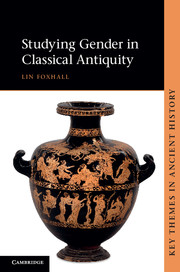Book contents
Chapter 4 - Bodies
Published online by Cambridge University Press: 05 May 2013
Summary
GENDER AND THE ‘NATURAL’ BODY
In the Greek world, to have a body defined the human condition. Although gods were visually represented with bodies that appear human, these were qualitatively different from those of people (Osborne 2011: 185–215; Vernant 1991: 27–49), placing mortals lower in the cosmological hierarchy, and tying them to the need to eat, drink, reproduce, grow up, grow old and die. Gods, of course, did not eat food, though humans must. And because gods were immortal they were not compelled to die or reproduce, even though in myth they do quite a lot of reproducing. Indeed, when gods presented themselves to humans they regularly took on the form of a human body (e.g. Euripides Bacchae 4, 53–4; Homer Il. 4.86–7, 5.121–32; Od. 7.20).
Gender construed as polar opposition played a powerful role in shaping thought, belief and behaviour about the body in the classical world; although Greeks and Romans acknowledged and named various ‘in-between’ gendered behaviours and roles, these were usually characterized as problematic in some way, and not ‘natural’. Many of these ancient ideas about bodies (and the gendered characteristics believed to be inherent in them) had a very long afterlife, and worked their way into both western and Islamic thought, where they remained deeply lodged into early modern times (Tarlow 2011: 70–1; eighteenth-century anatomists were explicitly rejecting ancient constructions of the body, though the link between bodily decline and morality remained strong in popular belief, 88–9).
- Type
- Chapter
- Information
- Studying Gender in Classical Antiquity , pp. 68 - 89Publisher: Cambridge University PressPrint publication year: 2013



